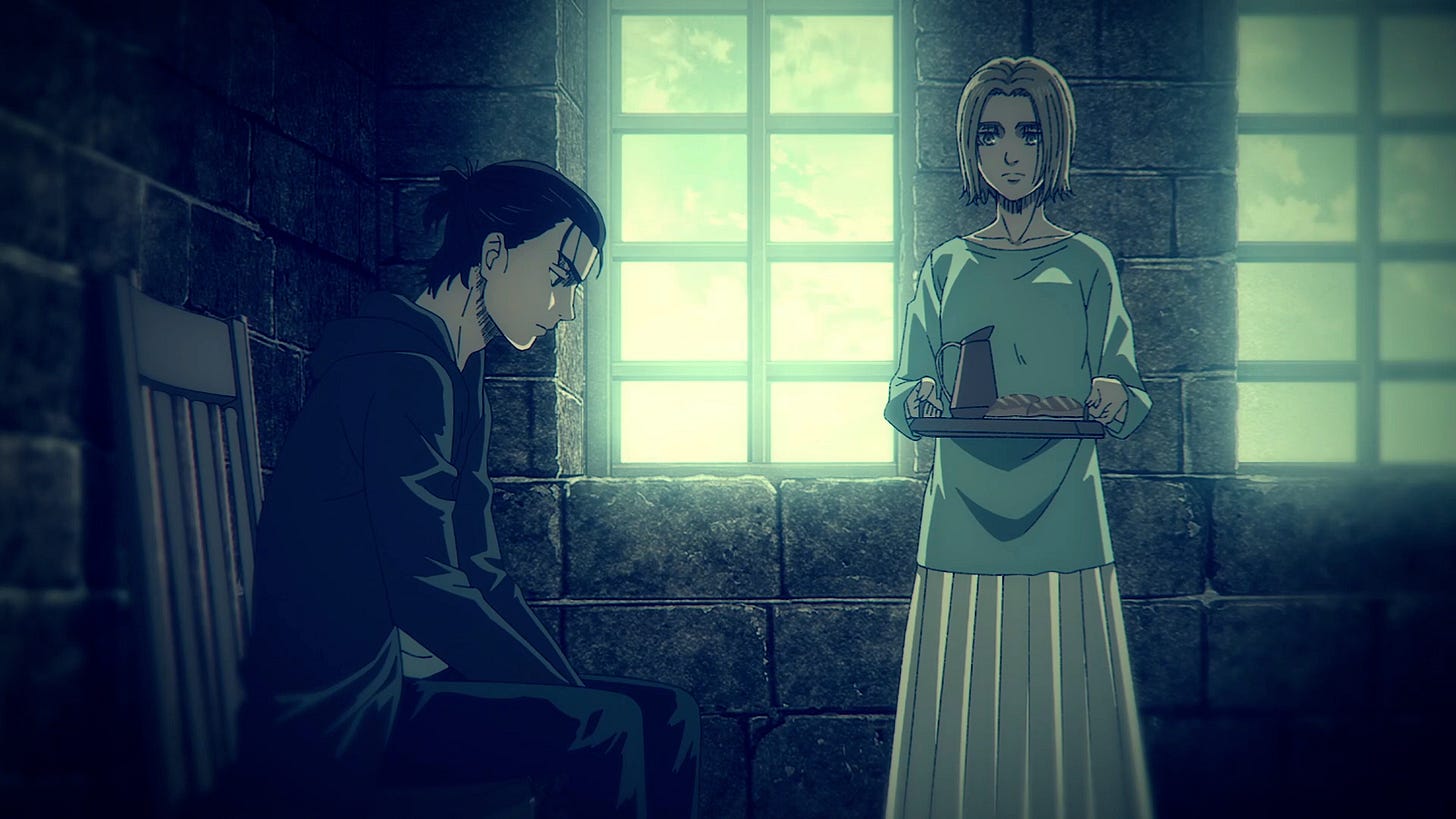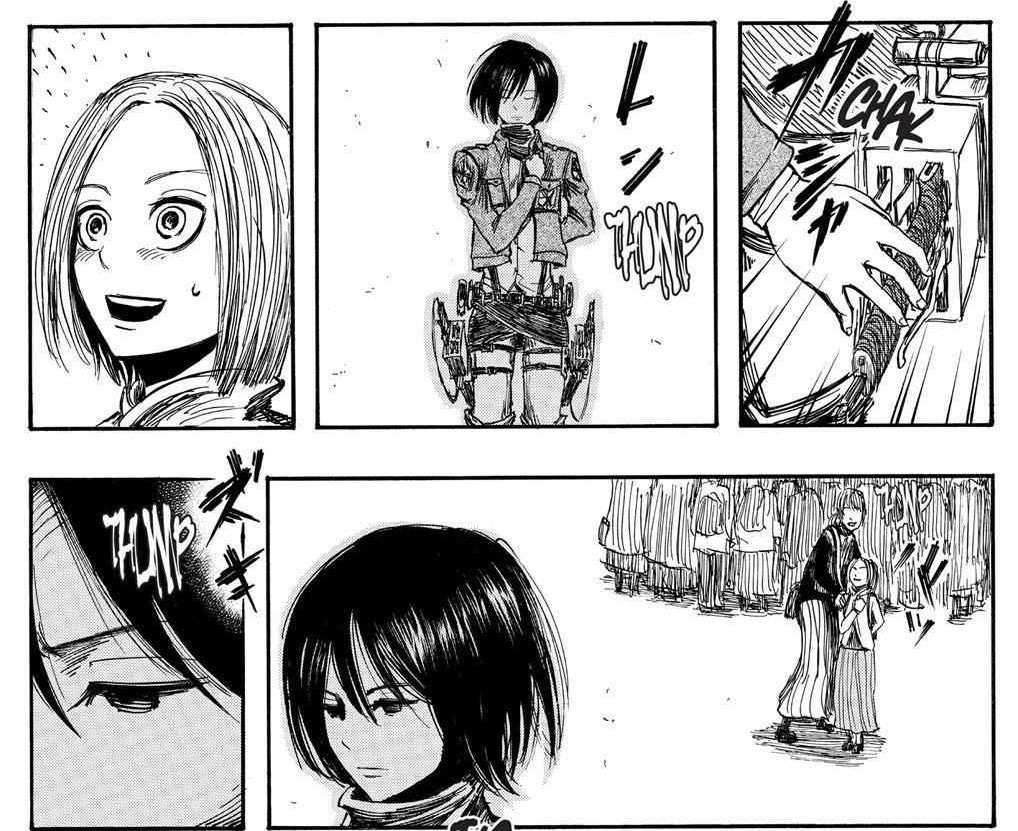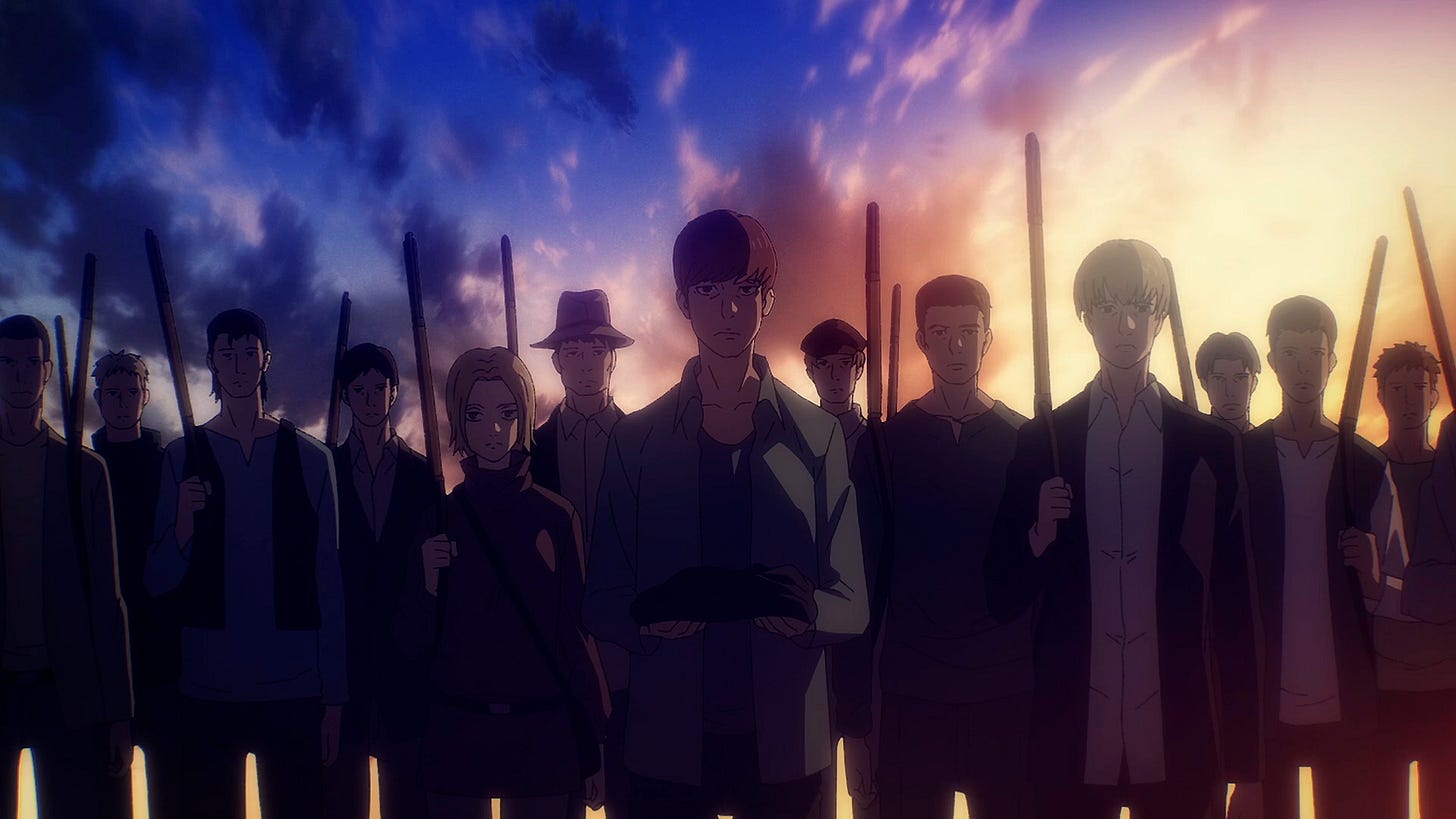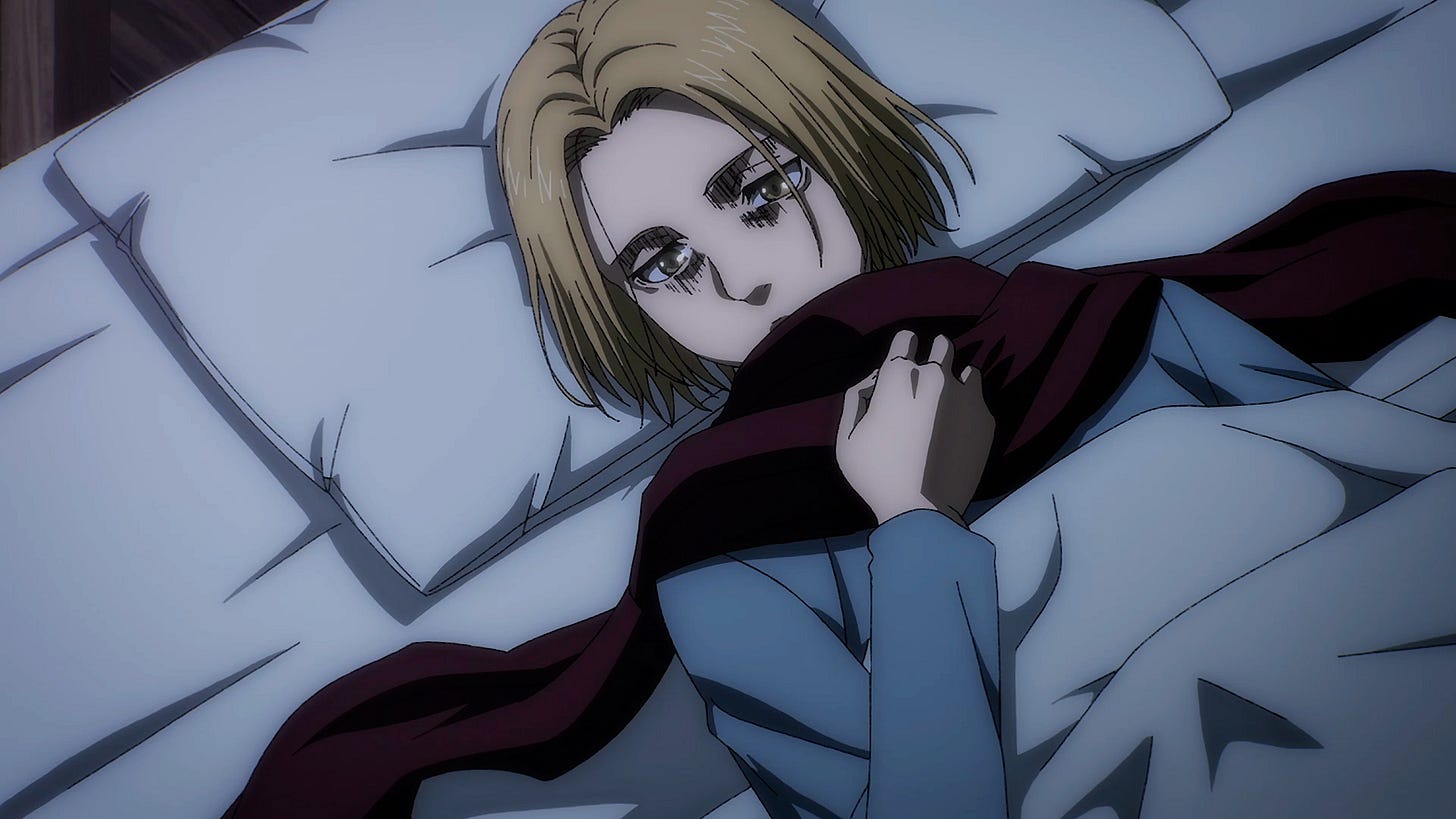An Analysis of Attack on Titan's Louise
How loyalty to nationalistic movements and misguided faith can hurt young people
Introduction:
Note: This analysis contains spoilers for the events of the fourth season of Attack on Titan.
Attack on Titan, as I’m sure many anime fans are well aware, is a masterclass of worldbuilding and character development. I’ve always had a fascination with Hajime Isayama’s writing and commend his commitment to making his world feel interconnected and realistic.
One aspect of Attack on Titan’s writing that I found myself falling in love with is the series’ side characters. There are literally dozens of unsung heroes throughout the story that have an impact on the plot and leave impressions on the main cast that sadly go unrecognized in the fandom.
So, welcome to the first installment of my side character analysis series, where I analyze these underrated figures and explain their importance, what they represent, and what they mean to the story as a whole.
I wanted to take the time to discuss Louise because, even years after the series’ conclusion, fans still seem to either misinterpret or forget the underlying meaning of her inclusion outside of her relationship to Mikasa.
First Appearance:
Louise is introduced as a seemingly one-off character in chapter 5 (Episode 6 of the anime) during the Struggle for Trost arc. After the Colossal Titan’s reappearance and destruction of the Trost District’s outer gate, the Garrison regiment’s main priority is the evacuation of civilians with assistance from members of the Cadet Corps.
Louise, only a young girl at the time, is one of the many citizens that is trapped within the city due to Dimo Reeves, a wealthy and powerful merchant in Wall Rose. Reeves and his men attempted to force his cart of supplies and luxuries through Trost’s inner gate, leading to the majority of its civilians being stuck in the district.
Louise’s mother reassures her that her father, presumably a soldier of the Garrison, will take out the invading Titans. Louise then points out an abnormal Titan as it enters the nearby street and charges towards the crowd of civilians, speeding out of reach of the Garrison soldiers pursuing it.
The Titan is then slain by Mikasa, who, in a show of her abilities, speeds ahead of the Garrison soldiers and takes the abnormal down singlehandedly. Mikasa then confronts Reeves and intimidates him into unblocking the inner gate and letting the other citizens through.
As the civilians evacuate, Louise and her mother express their gratitude toward Mikasa and thank her. Mikasa gives a salute to the two of them, which is followed by an ecstatic Louise saluting her back.
This moment is undeniably life-changing for Louise. Mikasa’s act of bravery and skill would go on to change the way the young girl perceived the world, one where strength should be prioritized above all else.
Mikasa becomes a symbol to Louise — not just of power, but of purpose and conviction in a world that constantly teeters between chaos and cruelty. However, as we later see, this idolization becomes warped, blurring the line between genuine respect and blind devotion.
This mindset would lead to Louise joining the Survey Corps before the events of season four, and eventually the Jeagerists as the season develops.
Season 4 Part 1:
When Louise reappears in Attack on Titan’s final season (Episode 65), she has joined the Survey Corps. Her youthful idealism and fascination with power have hardened into an unwavering belief that true freedom can only be achieved through decisive strength — the very ideology that fuels the Jeagerist ideology later on.
Louise participates in the Raid on Liberio alongside the other members of the Survey Corps. She joins the various characters we’ve come to know over the series, such as Jean, Connie, and Sasha, and is later shown celebrating the Eldian’s victory on the airship.
Louise, alongside others in Floch Forster’s ranks, looks up to Eren Jeager as a revolutionary, someone who will bring freedom to the Eldians of Paradis Island. To her, the Jeagerist movement represents liberation, not extremism.
We see this during the original creation of the Jeagerist movement. After the Scout Regiment’s return to Paradis, Eren is quickly and quietly detained, as he had gone rogue and infiltrated Marley by himself, causing Paradis to become involved on the world stage with their raid to retrieve him.
Louise is one of four members of the Survey Corps (under Floch’s guidance) who leak this information to the public, wanting to cause unrest among the citizens of the walls, as they believe Eren’s imprisonment is unjust.
The four are detained themselves. Mikasa is the one to take Louise to her cell, and the two have their second interaction in the series.
In this scene, Louise’s faith in the Jeagerist movement, much like her admiration for Mikasa, reveals her susceptibility to the allure of powerful figures. Louise expresses her continued admiration, even confessing that she joined the military because of her.
“I’m still the same person as the one you saved that day. I realized something when you, a human, took down that Titan: That without power, you can’t protect anything.” - Louise to Mikasa, Episode 70 “Deceiver”
Yet Mikasa, now disillusioned by years of trauma and conflict after the events of the series, rejects the pedestal Louise places her on. The interaction is brief but telling. Mikasa’s cold detachment clashes with Louise’s almost fanatical devotion, underscoring the divide in how each perceives strength and purpose.
The young girl then tries appealing to Mikasa’s emotions by bringing up Eren, but is coldly cut off. As Mikasa leaves, Louise salutes her, mirroring her first appearance.
Later on in chapter 109 (Episode 71), Eren uses the Warhammer Titan’s abilities to escape from his cell. During the chaos, guards who are loyal to him release the other Jeagerists offscreen.
Louise can be seen among the crowd led by Floch as they regroup with Eren, who orders them to locate Zeke, and thus, the Jeagerist agenda is officially put into motion.
Season 4 Part 2:
Louise’s next appearance in the story comes several chapters (and episodes) later. In chapter 117 (Episode 76 of the anime), the Jaegerists rally in the Shiganshina District after locating Zeke.
Marley’s military invades Paradis Island with several airships, using the surprise attack as a desperate final ploy to capture Eren and regain the power of the Founding Titan, and to retaliate for the raid on Liberio.
Louise joins Mikasa in gearing up for the battle, overly excited to finally be fighting alongside her idol.
“I’m glad. To think we’d be fighting for similar goals again…”
-Louise to Mikasa, Episode 77, “Sneak Attack”
Before leaving, Mikasa leaves her scarf behind, which Louise notices.
A few chapters later (Episode 81 of the anime), Marley’s sneak attack was for naught. Eren meets with Zeke, takes control of the full extent of the Founding Titan’s powers, and starts the Rumbling.
Paradis’ walls have collapsed, leaving the hundreds of thousands of Colossal Titans living inside to flatten the outside world. In the chaos, a multitude of Pure Titans surround Shiganshina’s military headquarters.
Louise is among the Jeagerists who assist Mikasa, Jean, and Armin in defeating the horde of Titans. As the battle is underway, she is saved from an encounter with one of them by Mikasa. Seeing her heroine in action, Louise is momentarily distracted, causing her to fly too close to a detonating Thunder Spear.
After the initial chaos settles and the Jeagerists take control of the island, Mikasa realizes her scarf is missing. She eventually finds it, alongside Louise, who has been wearing it, most likely as a way to comfort herself.
In chapter 126 (Episode 83 of the anime), Mikasa and Louise have their final interaction.
The explosion hospitalizes Louise. She reveals to her heroine that the earlier battle resulted in unremovable Thunder Spear shrapnel becoming lodged in her stomach.
She regrets the fact that she won’t be able to see the outcome of Eren’s plan and the “free world” that would be created as a result.
Louise also mentions that she got the chance to speak with Eren about Mikasa, claiming that he instructed her to throw the scarf away. This then prompts Mikasa to demand the scarf be returned.
As Mikasa leaves, Louise claims she had no regrets in the life she lived, and we never see the young girl again.
Louise’s presumed death, to me, is scarlily realistic. In a series where we’ve seen countless characters eaten alive, shot, flattened, and mutilated, seeing this young girl slowly dying from internal wounds sticks with me.
A quick aside about the scene as a whole:
Louise is introduced in Attack on Titan with a clear narrative purpose: to serve as a foil to Mikasa — the kind of unquestioning follower Eren once accused Mikasa of being in chapter 113 (Episode 73 of the anime).
After being saved as a child, her admiration of Mikasa evolved into a “might makes right” philosophy, leading her to idolize both her and, later, Eren, for all the wrong reasons.
Louise’s devotion was rooted in a misunderstanding. She admired Eren’s violent defense of Mikasa as a display of strength, while Mikasa cherished that same act, and the scarf, as a gesture of compassion and protection.
By the time of their last interaction, this contrast has come full circle. Louise’s blind loyalty to Eren and the Jaegerist cause ultimately seals her fate. Yet, in clinging to Mikasa’s scarf, even after Eren told her to discard it, she inadvertently offers Mikasa a chance to reclaim it on her own terms.
In that moment, Mikasa symbolically asserts her independence and reclaims her agency. She is no longer the obedient soldier or the girl defined by Eren’s will.
When she refuses to offer Louise comfort in her final moments, it’s not out of cruelty, but clarity: Mikasa has finally separated the compassionate Eren she once loved from the destructive force he’s become during the events of the series’ final season.
Conclusion:
Louise’s inclusion in Attack on Titan unfortunately goes unnoticed by most fans of the series.
Her story reflects how the search for meaning and empowerment can be manipulated by larger forces, turning passion into fanaticism. Louise’s journey from an inspired child to a devoted Jeagerist is a microcosm of how Attack on Titan explores the dangers of extremist ideologies and nationalistic movements.
Her blind fanaticism with Mikasa, Eren, and Floch leads to her downfall.
In the end, Louise isn’t just a side character that was simply brought back. She embodies the nameless followers drawn into revolutionary movements by charisma, conviction, or out of of fear.
Her brief, tragic arc serves as a haunting reminder that even noble intentions, such as admiration and the desire for freedom, can be twisted when placed in the shadow of powerful ideals.
“I have no regrets. Because I gave my heart and my life following in your footsteps.”
-Louise to Mikasa, Episode 83, “Pride”




